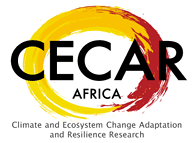A meeting for the Climate and Ecosystem Change Adaptation and Resilience Research (CECAR) Africa project was held in Accra, Ghana, to formally commence the operational phase of the project, which aims to overcome the vulnerability to climate change of terrestrial ecosystems in developing countries, particularly in Africa.
 11 June 2012: A five-year research project on Enhancing Resilience to Climate and Ecosystem Changes in Semi-Arid Africa: An Integrated Approach (CECAR-Africa) held a kick-off meeting to formally commence its operational phase. CECAR-Africa focuses on the vulnerability of terrestrial ecosystems to climate change in developing countries, particularly in Africa.
11 June 2012: A five-year research project on Enhancing Resilience to Climate and Ecosystem Changes in Semi-Arid Africa: An Integrated Approach (CECAR-Africa) held a kick-off meeting to formally commence its operational phase. CECAR-Africa focuses on the vulnerability of terrestrial ecosystems to climate change in developing countries, particularly in Africa.
CECAR-Africa is a five-year (2011-2016) project focused on: evaluating the impact of climate and ecosystem change on agrodiversity; assessing the risk of extreme weather hazards; developing adaptive resource management methods; and implementing capacity development programmes for locals. The meeting, which took place on 2 May 2012, at the UN University (UNU) Institute for Natural Resources in Africa (INRA) in Accra, Ghana, brought together delegates from the project’s Japanese institutions – the University of Tokyo, the UNU Institute for Sustainability and Peace (UNU-ISP) and Kyoto University – as well as African counterparts from the University of Ghana, the University for Development Studies (UDS, Ghana), the Ghana Meteorological Agency (GMeT) and UNU-INRA.
Sessions addressed, inter alia: research structure, planning and operational aspects of the institutional collaboration; short- and long-term research plans; and preliminary project site selection and field visits. The 15-member delegation also visited potential study sites and met community members in northern Ghana. [CECAR-Africa Website] [UNU Press Release]